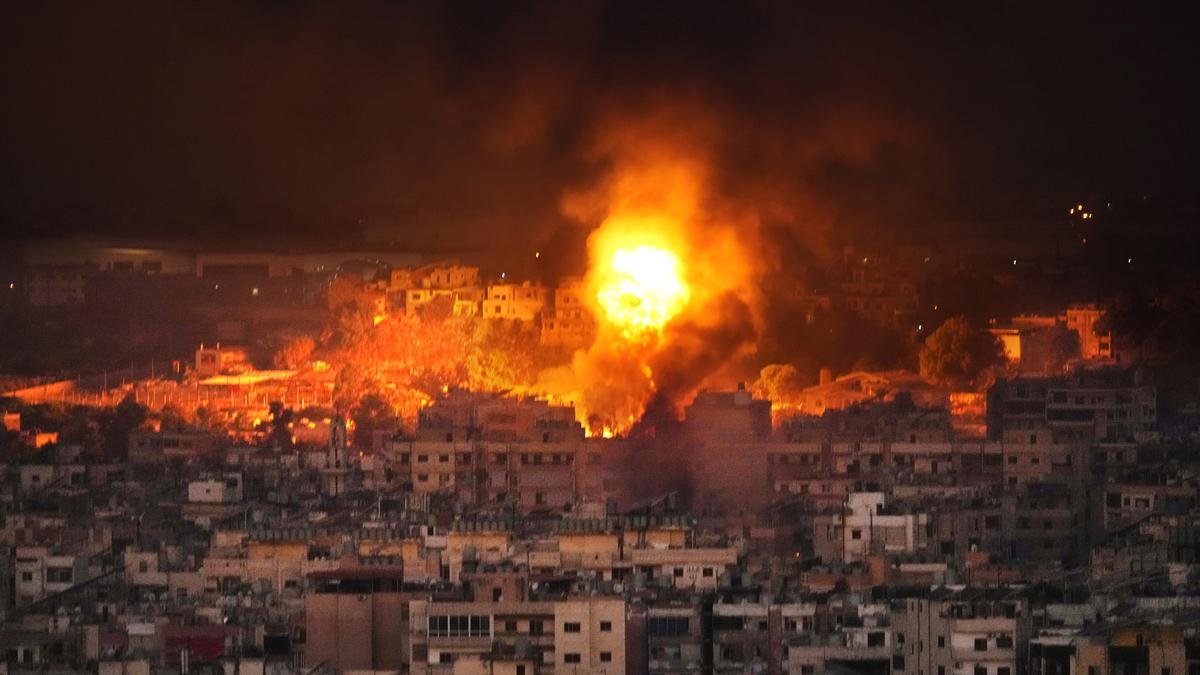Israel’s military said Thursday it had hit Hezbollah’s intelligence headquarters in Beirut, as reports surfaced that Hashem Safieddine, the presumed successor to slain Hezbollah leader Hassan Nasrallah, had been targeted during airstrikes in the Dahieh suburb.
This comes after Israeli troops began ground raids into parts of southern Lebanon, a Hezbollah stronghold, following days of bombing in areas across the country where the group has control. The Israeli strikes in Beirut were aimed at a meeting of senior Hezbollah leaders, including Safieddine, who heads the Iran-backed group’s executive council and oversees military operations, according to The New York Times.
🔴Mahmoud Yusef Anisi, a senior terrorist involved in Hezbollah’s precision-guided missile manufacturing chain in Lebanon.
Anisi joined Hezbollah over 15 years ago and was one of the leaders of the Hezbollah PGM campaign in Lebanon. He was a significant source of knowledge with… pic.twitter.com/AJ6BpYOL4s
— Israel Defense Forces (@IDF) October 3, 2024
Safieddine is widely regarded as the heir to the late Hezbollah leader Nasrallah, who was killed in an Israeli airstrike that also targeted dozens of other leaders of the Iran-backed group. The US State Department designated him a terrorist in 2017. He is Nasrallah’s cousin.
Israel carried out 11 consecutive strikes on the group’s south Beirut stronghold late Thursday, in one of the most violent raids since the country ramped up its bombardment campaign last week. According to Lebanon’s official National News Agency (NNA), “More than 10 consecutive strikes have been recorded so far, in one of the strongest raids on the southern suburbs of Beirut since the start of the Israeli war on Lebanon”. According to the NNA, the strikes echoed in mountain regions outside Beirut.
Separately, in a joint counterterrorism operation, the Israel Defense Forces and Israel Security Agency killed Zahi Yaser Abd al-Razeq Oufi, the leader of the Hamas terrorist network, in Tulkarm on Thursday. The Israeli Air Force launched an intelligence-based strike in the Tulkarm area, where Oufi was suspected of planning and leading an attempted car bombing attack in Ateret on September 2.
Reported site in Beirut that was struck by the Israeli military. The target of the attack was an underground site where Hashem Saffedine may have been located. pic.twitter.com/mEwiJf2cXh
— Joe Truzman (@JoeTruzman) October 3, 2024
He was in charge of supplying weapons to various terrorists in the region, as well as orchestrating a number of other terror attacks against Judea and Samaria communities and the Israeli home front. Oufi was reportedly preparing to launch a new attack soon. He was also involved in several significant attacks on Israeli civilians.
The Israeli military has also announced the death of Mahmoud Yusef Anisi, a senior Hezbollah member involved in the organization’s weapons manufacturing efforts. Anisi was killed earlier this week by an Israeli Air Force precision strike in Beirut.
Anisi was a key leader in Hezbollah’s Precision Guided Missile (PGM) campaign in Lebanon, and he had extensive technological knowledge of weapon manufacturing. He had been with Hezbollah for over 15 years and had a degree in mechanical engineering, where he used his skills to develop advanced weapons for the organization.
These consecutive strikes on Hamas and Hezbollah are part of Israel’s military campaign, which has now shifted its focus to Lebanon. Earlier Thursday, Israeli army Arabic-language spokesperson Avichay Adraee issued a “urgent warning” to residents of the south Beirut neighborhood of Burj al-Barajneh to evacuate, along with maps of the area. He later issued an evacuation order for the Hadath neighborhood in Beirut’s south.
“You are located near facilities and interests belonging to Hezbollah, and the IDF (Israeli army) will work against them in the near future,” he had warned in a statement regarding X. Israel announced this week that its troops had begun “ground raids” into parts of southern Lebanon, following days of heavy bombardment of Hezbollah strongholds throughout the country.
After nearly a year of low-intensity cross-border fighting, Israel has expanded its military campaign beyond Gaza to Lebanon, where heavy bombing has killed over 1,000 people and forced hundreds of thousands to flee their homes. Last week, Israel assassinated Hezbollah leader Nasrallah in south Beirut, a densely populated area, before residents fled Israel’s intensifying bombardment.
